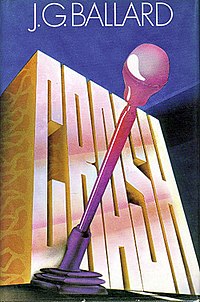This is an old revision of this page, as edited by 72.132.30.75 (talk) at 06:03, 25 June 2016 (→External links). The present address (URL) is a permanent link to this revision, which may differ significantly from the current revision.
Revision as of 06:03, 25 June 2016 by 72.132.30.75 (talk) (→External links)(diff) ← Previous revision | Latest revision (diff) | Newer revision → (diff)| This article needs additional citations for verification. Please help improve this article by adding citations to reliable sources. Unsourced material may be challenged and removed. Find sources: "Crash" Ballard novel – news · newspapers · books · scholar · JSTOR (August 2009) (Learn how and when to remove this message) |
 Cover of first edition (hardcover) Cover of first edition (hardcover) | |
| Author | J. G. Ballard |
|---|---|
| Language | English |
| Genre | Postmodern novel, Transgressive fiction |
| Publisher | Jonathan Cape |
| Publication date | June 1973 |
| Publication place | United Kingdom |
| Media type | Print (Hardcover & Paperback) |
| ISBN | 0-224-00782-3 |
| OCLC | 797233 |
| Dewey Decimal | 823/.9/14 |
| LC Class | PZ4.B1893 Cp PR6052.A46 |
| Preceded by | The Atrocity Exhibition |
| Followed by | Concrete Island |
Crash is a novel by English author J. G. Ballard, first published in 1973. It is a story about symphorophilia specifically car-crash sexual fetishism: its protagonists become sexually aroused by staging and participating in real car-crashes.
It was a highly controversial novel: one publisher's reader returned the verdict "This author is beyond psychiatric help. Do Not Publish!" In 1996, the novel was made into a film of the same name by David Cronenberg. An earlier, apparently unauthorized adaptation called Nightmare Angel was filmed in 1986 by Susan Emerling and Zoe Beloff. This short film bears the credit "Inspired by J.G. Ballard."
Plot summary
The story is told through the eyes of narrator James Ballard, named after the author himself, but it centers on the sinister figure of Dr. Robert Vaughan, a "former TV-scientist, turned nightmare angel of the expressways". Ballard meets Vaughan after being involved in a car accident himself near London Airport. Gathering around Vaughan is a group of alienated people, all of them former crash victims, who follow him in his pursuit to re-enact the crashes of celebrities and experience what the narrator calls "a new sexuality, born from a perverse technology". Vaughan's ultimate fantasy is to die in a head-on collision with movie star Elizabeth Taylor.
References in popular art
Music
The Normal's 1978 song "Warm Leatherette" was inspired by the novel, as was "Miss the Girl," a 1983 single by The Creatures. The Manic Street Preachers' song "Mausoleum" from 1994's The Holy Bible contains the famous Ballard quote about his reasons for writing the book.
The singer Glenn Danzig sings about this in his band Samhain's song "Kiss Of Steel" on the album "November-Coming-Fire"
Other
The RanXerox comics story "RanXerox in New York" features a character called Timothy who declares he is sexually aroused by "the meeting of flesh and metal in car crashes", then shows a photomontage he made of a female model with photos of wounds from a medical dictionary, claims to be in love with Brooke Shields and finally declares that his "dream is to die in an accident at the same time she does and to have an orgasm at the moment of impact". He almost fulfills his dream: forgotten in the trunk of the taxi RanXerox drives while living in New York, he is a collateral casualty of a titanic clash between RanXerox and the Boyband he was racing against. Still Standing, RanX remembers about him and rushes to rescue him. His ecstatic, dying remarks are: "Wow, Ranx... Incredible... who did we crash with?" at which the synthtic thug replies "Brooke Shields", and Timothy expires happily. the original title of the story was "Buon Compleanno Lubna" ("Happy Birthday Lubna").
See also
References
- Lars Svendsen, A Philosophy of Boredom, trans. John Irons (London: Reaktion Books, 2005), 82.
- Taylor, Brett (Oct–Nov 2009). "The Forgotten Crash: Nightmare Angel". Video Watchdog (152): 12–16.
- "Heavy Metal Magazine, January 1984, Vol. 7 No. 10, pg.12-20'". Heavy Metal Magazine. January 1984.
External links
- The Terminal Collection: JG Ballard First Editions
- Crash at the British Library